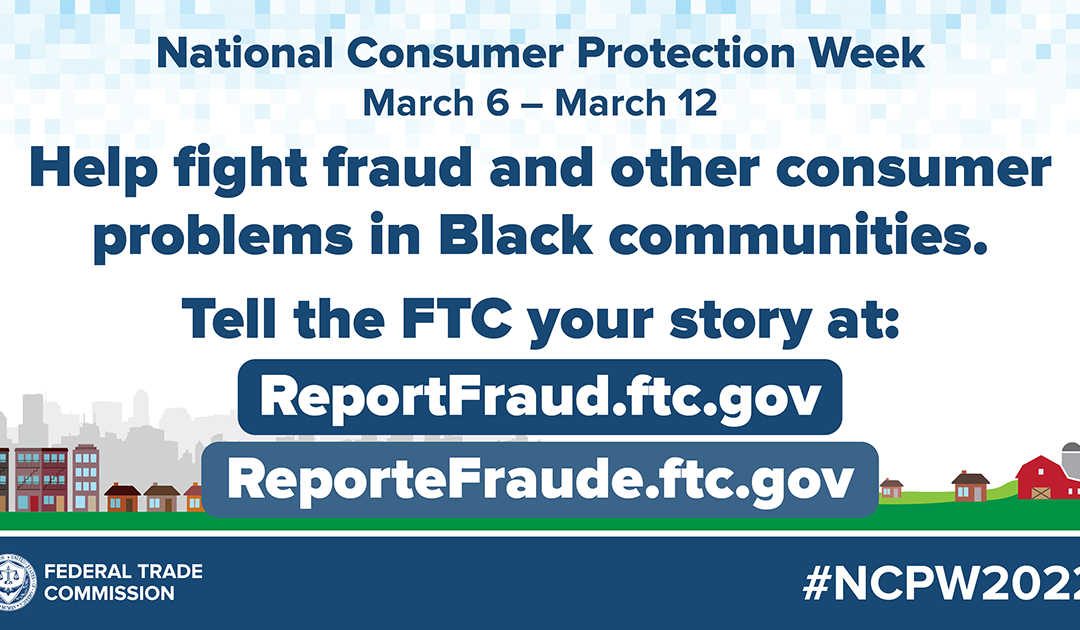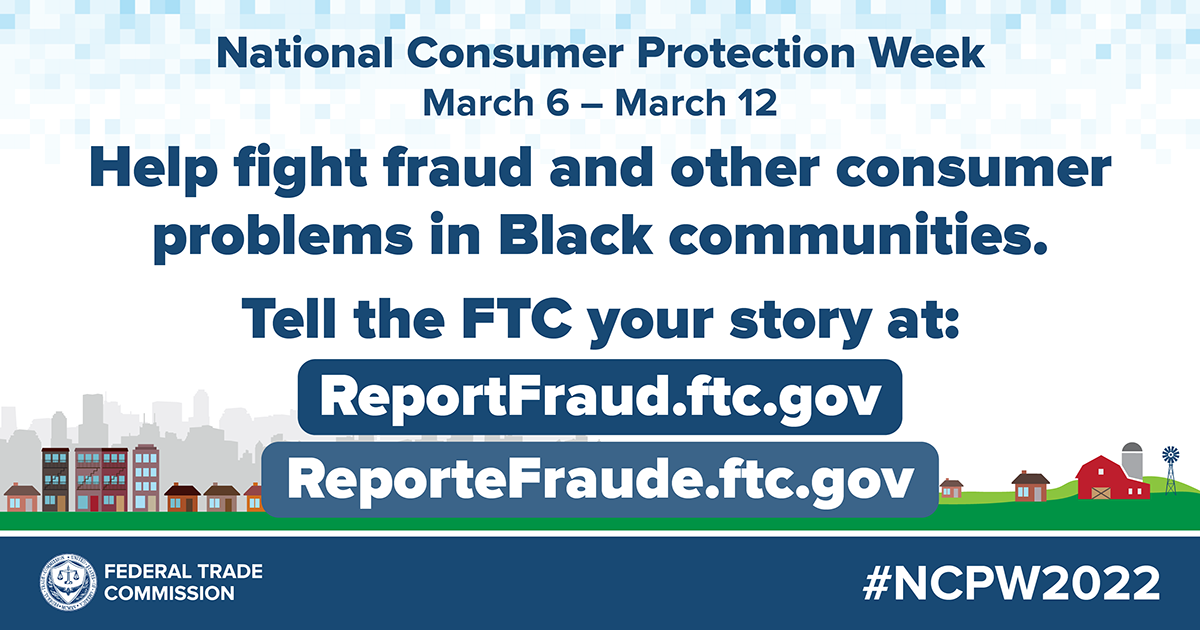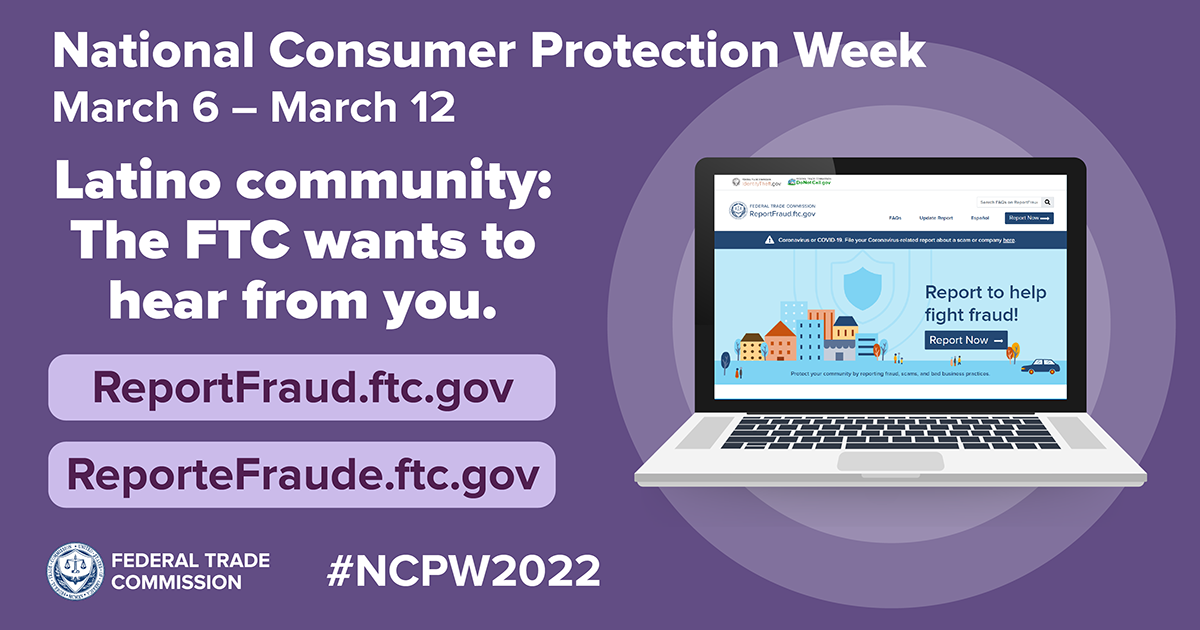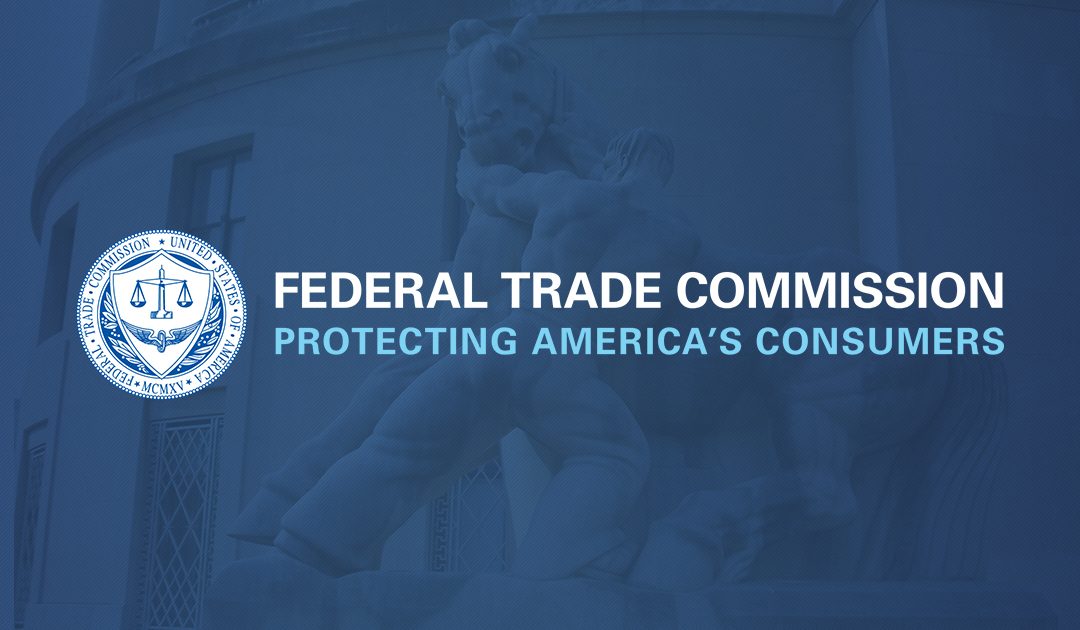
by Scott Muniz | Mar 7, 2022 | Security
This article was originally posted by the FTC. See the original article here.


We know scammers target people everywhere. So this National Consumer Protection Week, we’re focusing on how fraud affects every community. In blog posts and events this week, we’ll highlight scams that affect some of those communities, including older adults, college students, servicemembers, and LGBTQ+ communities. Since scammers target every community, including yours, you can make a difference this NCPW: recruit your friends, family, and neighbors across all communities to report the scams they’re seeing to us.
The way fraud affects every community can look different across different demographic groups. For instance, the FTC’s Serving Communities of Color Report highlights some of the unique ways that people experience fraud in Black and Latino communities.
Here are just two examples of the differences we saw:
- Fraud and bad business practices play out differently in different communities. The FTC’s reporting data showed that the top percentage of reports by people living in majority White and majority Latino communities were about impersonator scams. In majority Black communities, the top percentage of reports were about credit bureaus.
- Scammers tell people to pay in different ways. Reports from majority Black and Latino communities show that people are more likely to end up paying scammers in ways that have few, if any, fraud protections ― so: cash, cryptocurrency, money orders, and debit cards. In contrast, reports from majority White communities show that people are more likely to pay scammers with credit cards.
Throughout the week, we’ll talk more about how fraud looks different across different communities. But today is about your community. Please remind your friends, family, and neighbors: if they see a scam, tell the FTC at ReportFraud.ftc.gov. And tune in for the rest of the week’s posts, and check out #NPCW2022 events at ftc.gov/ncpw. We hope to see you at some of them.
Brought to you by Dr. Ware, Microsoft Office 365 Silver Partner, Charleston SC.

by Scott Muniz | Mar 4, 2022 | Security
This article was originally posted by the FTC. See the original article here.
Advertised as a weight management service for kids, teens, and families, the Kurbo by WW app and website let kids as young as 8 track their weight, food intake, activity, and more. The problem? Many parents didn’t know their kids were using it, while the app and website were collecting and keeping information about kids without their parents’ permission.
Today the Department of Justice and FTC announced that Kurbo and its parent company WW International (formerly Weight Watchers) have agreed to settle charges they collected personal information from kids under 13 without notifying parents or getting their permission — something the Children’s Online Privacy Protection Rule (COPPA Rule) requires. That personal information included name, phone number, birth date, and persistent identifiers, including device IDs corresponding to specific accounts.
To settle the charges, the companies have agreed to pay a $1.5 million civil penalty, delete all personal information collected from kids under 13 without parental permission, and destroy any algorithms that used this illegally collected information. In the future, they must destroy any information they collect from kids under 13 if it’s been more than a year since the kid used their app.
Read How To Protect Your Privacy on Apps or visit ftc.gov/YourPrivacy to learn more about protecting your family’s privacy online.
Brought to you by Dr. Ware, Microsoft Office 365 Silver Partner, Charleston SC.

by Scott Muniz | Mar 3, 2022 | Security
This article was originally posted by the FTC. See the original article here.
Wouldn’t it be nice if all you had to do to get rid of COVID-19 was drink some tea? Well, selling people easy, feel good products — without competent scientific evidence — is something scammers are good at — and the FTC is working aggressively to stop them.
In the FTC’s latest case targeting fake COVID-19 cure claims, the agency took action against B4B Earth Tea, LLC. The company claims drinking their beverage (which sells for $60 per 16-ounce bottle) will cure the disease. But the complaint, filed by the Department of Justice on the FTC’s behalf, says the company doesn’t have scientific evidence to back up their treatment or prevention claims.
There are no supplements proven to treat or prevent COVID-19.
When it comes to fighting COVID-19 and spotting unsupported treatment claims:
- Always talk with your doctor or healthcare professional before you try any product claiming to treat, prevent, or cure COVID-19.
- When there’s a medical breakthrough to treat, prevent, or cure a disease, you’re not going to hear about it for the first time through an ad or sales pitch on social media.
- Visit CDC.gov and the FDA.gov for the most up-to-date information about COVID-19 and available vaccines.
Now, please share what you know, and ask others to do the same.
Brought to you by Dr. Ware, Microsoft Office 365 Silver Partner, Charleston SC.
by Scott Muniz | Mar 3, 2022 | Security, Technology
This article is contributed. See the original author and article here.
The National Security Agency (NSA) has released a new Cybersecurity Technical Report (CTR): Network Infrastructure Security Guidance. The report captures best practices based on the depth and breadth of experience in supporting customers and responding to threats. Recommendations include perimeter and internal network defenses to improve monitoring and access controls throughout the network.
CISA encourages network architects, defenders, and administrators to review NSA’s Network Infrastructure Security Guidance as well as CISA’s recently published Layering Network Security Through Segmentation infographic for assistance in hardening networks against cyber threats.
by Scott Muniz | Mar 3, 2022 | Security, Technology
This article is contributed. See the original author and article here.
CISA has added 95 new vulnerabilities to its Known Exploited Vulnerabilities Catalog, based on evidence of active exploitation. These types of vulnerabilities are a frequent attack vector for malicious cyber actors and pose significant risk to the federal enterprise. Note: to view the newly added vulnerabilities in the catalog, click on the arrow on the of the “Date Added to Catalog” column, which will sort by descending dates.
Binding Operational Directive (BOD) 22-01: Reducing the Significant Risk of Known Exploited Vulnerabilities established the Known Exploited Vulnerabilities Catalog as a living list of known CVEs that carry significant risk to the federal enterprise. BOD 22-01 requires FCEB agencies to remediate identified vulnerabilities by the due date to protect FCEB networks against active threats. See the BOD 22-01 Fact Sheet for more information.
Although BOD 22-01 only applies to FCEB agencies, CISA strongly urges all organizations to reduce their exposure to cyberattacks by prioritizing timely remediation of Catalog vulnerabilities as part of their vulnerability management practice. CISA will continue to add vulnerabilities to the Catalog that meet the specified criteria.
Note: prioritizing software updates that address known exploited vulnerabilities is one of the actions CISA encourages as part of the recent Shields Up recommendations to all stakeholders. CISA appreciates the contributions of Joint Cyber Defense Collaborative (JCDC) partners to this recent addition to the catalog.







Recent Comments